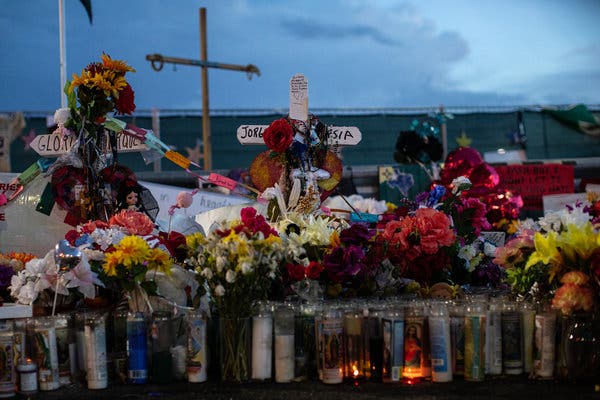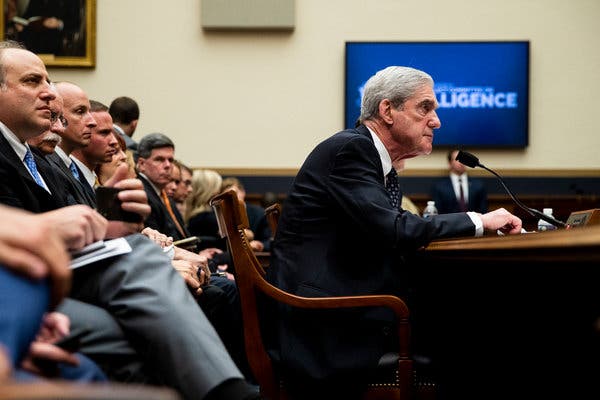Advertisement
The man charged in a shooting at a Walmart that left 22 people dead had railed in a manifesto about “the Hispanic invasion of Texas.”

EL PASO — A federal grand jury on Thursday indicted the suspect in last summer’s mass shooting at an El Paso Walmart on federal hate crime charges, accusing the 21-year-old former college student of targeting Hispanics in a racially motivated massacre that left 22 people dead.
Patrick Crusius of Allen, Texas, already faced state charges in connection with the Aug. 3 shooting. Prosecutors said he donned headphone-style ear protectors and carried an AK-47-style rifle as he opened fire inside the busy border-city Walmart. Within minutes, nearly 50 men, women and children were killed or wounded in the deadliest anti-Latino attack in modern American history.
In announcing the charges on Thursday evening in downtown El Paso, officials from the Justice Department and the F.B.I. said the gunman attacked the victims because of their actual and perceived national origin. The 90-count indictment charges him with 22 counts of hate crimes resulting in death, 23 counts of hate crimes involving attempted murder for those who were wounded and 45 counts of discharging a firearm in the commission of a hate crime.
“People in our nation have the right to go to a store on a Saturday morning without fear that they will be shot and killed because of who they are or where they are from,” Eric Dreiband, the assistant attorney general for civil rights, told reporters on Thursday in El Paso.
“This hate crime may be considered an act of domestic terrorism,” he said, adding that the suspect “tried to terrorize an entire community.”
The federal government has identified racially motivated attacks as one of the nation’s top national security threats. Hate crimes against Latinos rose more than 13 percent from 2017 to 2018, according to the F.B.I.’s annual compilation of bias-motivated attacks.
The attack at Walmart cut deep into the fabric of the binational, bicultural and bilingual city connected by bridges and generations of families to its sister city of Ciudad Juárez in Mexico. Most of the people killed or wounded were either Mexicans or Mexican-Americans. Minutes before the shooting, the suspect posted a lengthy anti-immigrant manifesto online, declaring that the attack was a response to “the Hispanic invasion of Texas” and “all the problems these invaders cause and will cause.”
For months, Hispanic residents, elected officials and activists in El Paso and other Texas cities have been calling the Walmart shooting a hate crime. They had been calling on the Trump administration to take federal action in the largest anti-Latino attack in the country, just as Dylann S. Roof, the white supremacist who killed nine black parishioners in 2015 at Emanuel African Methodist Episcopal Church in South Carolina, was convicted on 33 federal charges that included hate crime charges.
“This was the intersection of racism and mass violence,” said Texas State Representative César Blanco, a Democrat and Navy veteran whose district includes the Walmart. “What he did in our community, based on the manifesto that was posted in advance of the massacre, definitely tells us where his mind was.”
In the aftermath of the attack, some in El Paso feared that copycat anti-Latino shootings would strike the city. As a result, several Hispanic residents and survivors sought to protect themselves — buying firearms, target-practicing at shooting ranges and applying for state-issued licenses to carry handguns.
Many others, including some Democratic lawmakers, blamed the White House for stoking hatred against Latinos with anti-immigrant rhetoric and policies.
When asked by a reporter on Thursday about the administration’s anti-immigrant rhetoric, the United States attorney in El Paso, John F. Bash, said the indictment charged the only person he believed was responsible for the attack — the gunman.
“What we prosecute is crimes of violence,” Mr. Bash said. “We don’t prosecute speech. And what I can say to the Hispanic community is that the Justice Department is totally engaged in stopping people who, for whatever motivation, but in particular for hateful motivations, would plot acts of violence on other people.”
In the six months since the shooting, El Paso remains in the midst of healing.
The Walmart store reopened just 12 weeks ago, and the last funeral a month before that — the services for Jorge Calvillo García, 61, were delayed so his wounded son could attend after being released from the hospital. The last remaining patient at the University Medical Center of El Paso — Mario De Alba, 48, a repairman from the Mexican state of Chihuahua who was shot in the back while shielding his wife and 9-year-old daughter — left the hospital in November, but he is expected to return this month for a follow-up surgery. One other victim, Guillermo Garcia, a girls’ soccer coach, has been hospitalized since the shooting and continues to receive treatment at Del Sol Medical Center.
“It’s been a long six months,” said Mr. Blanco, the state lawmaker. “This is another reminder that this is still a part of this process, and our community wants to heal, but we understand that the healing process will take many, many, many years.”
The Justice Department said it had charged more than 330 defendants with hate crimes since the federal hate crimes law was expanded in 2009, including more than 70 over the past three years.
While the department under President Barack Obama worked to expand civil rights protections to more groups of people, including gay and transgender people, the Trump administration has argued that it is not the Justice Department’s job to push the boundaries of who is protected.
Still, the department, under both Jeff Sessions and William P. Barr as attorney general, has continued to aggressively prosecute hate crimes. Mr. Sessions authorized that the murder of a transgender teen be prosecuted as a hate crime, even as the department resisted civil rights protections for transgender people.
The charges against the Walmart shooting suspect were filed just weeks after Jay Tabb, the head of national security for the F.B.I., said at an event in Washington that the bureau had seen “a significant increase in racially motivated violent extremism in the United States,” along with an increase in white nationalism and white supremacy extremist movements.
The 2,300-word anti-immigrant manifesto traced to the El Paso suspect mentioned a conspiracy theory popular among white nationalists known as the “great replacement,” which suggests that the white population is being deliberately edged out by nonwhite people.
That rhetoric was also echoed during the 2017 white supremacist rally in Charlottesville, Va., when marchers chanted “you will not replace us,” and in the rambling manifesto written by the terrorist who killed more than 50 people in attacks on mosques in Christchurch, New Zealand, last spring.
Last month the Justice Department also identified and disrupted three white supremacist domestic terrorists who were members of a group called the Base, which seeks to spark a race war and create a white ethno-state.
In court documents filed on Thursday in El Paso, prosecutors allege that Mr. Crusius bought the semiautomatic rifle he used in the attack, along with 1,000 rounds of hollow-point ammunition, on the internet.
The suspect drove nearly 10 hours overnight from his home in Allen, in the Dallas-Fort Worth area, to the Walmart in El Paso, they said. After uploading his manifesto online, the documents said, the suspect opened fire, first outside the store and then inside.
Mark Stevens, a lawyer representing the defendant, did not return a phone call seeking comment.
Mr. Crusius was indicted in September on a state charge of capital murder, a crime in Texas that is punishable by death or life in prison without parole. State prosecutors vowed to seek the death penalty.
The same potential punishment exists under the federal charges. Officials said Mr. Barr will decide later whether to seek the death penalty. The attorney general has been a proponent of the death penalty and has sought to resume federal executions, but plans to execute current death row inmates have been held up in the courts.
Erin Coulehan reported from El Paso, Katie Benner from Washington and Manny Fernandez from San Antonio.


